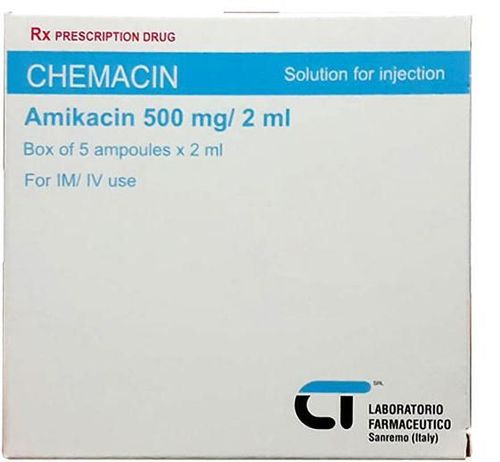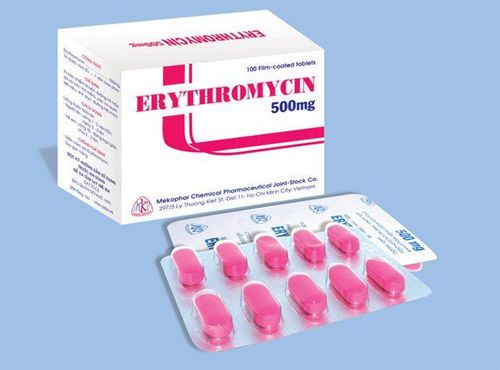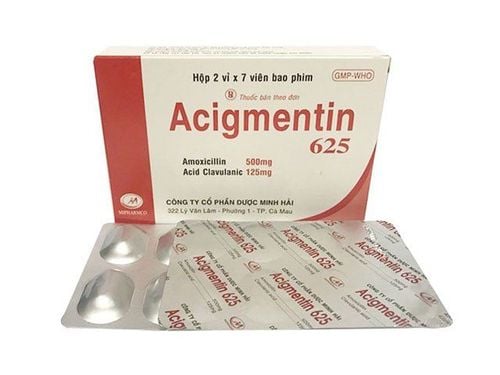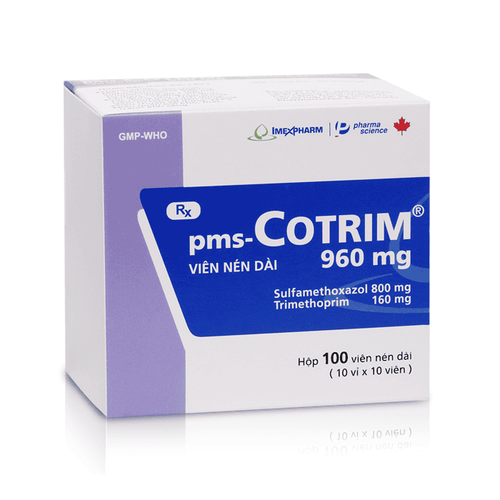This is an automatically translated article.
ArdineClav 500/125 (tablets) including Amoxicillin and Clavulanic Acid is indicated for the treatment of respiratory, skin - soft tissue, genital - urinary infections,... Let's learn the uses of ArdineClav 500/ 125 through the article below.
1. What is ArdineClav 500/125 (tablet)?
Producer: Laboratorio Reig Jofre, S.A.
Packing: Box of 5 blisters x 6 tablets.
Dosage form: Film coated tablets.
Ingredients
Each tablet contains the following ingredients:
Amoxicillin trihydrate equivalent to Amoxicillin 500mg. Clavulanate potassium equivalent to Clavulanic acid 125mg. Excipients are sufficient.
2. Uses of the drug Ardineclav
Effects of the main ingredients in the formula
Amoxicillin:
+ Is a beta-lactam antibiotic with bactericidal effect thanks to the mechanism of inhibiting transglycosylase enzyme, preventing the formation of peptidoglycan net, and inhibiting cell membrane formation. cells, thereby killing the bacteria.
+ Amoxicillin will lose its activity if hydrolyzed under the action of beta-lactamase.
Clavulanic acid:
+ Also has a bactericidal effect but is usually weak, but has a high affinity for beta-lactamase enzymes secreted by bacteria.
+ Due to its structural similarity to penicillin group antibiotics, clavulanic acid will act as a competitive inhibitor of beta-lactamase binding.
When used concurrently will protect Amoxicillin from hydrolysis. Moreover, it will synergistically expand the antibacterial spectrum of Amoxicillin against antibiotic-resistant bacteria with the mechanism of hydrolytic enzyme secretion.
Antibacterial spectrum of Amoxicillin/Clavulanic Acid:
+ Gram (+): Staphylococcus aureus (including penicillinase-producing strains), Staphylococcus saprophyticus, Streptococcus pneumoniae (except penicillin-resistant strains), Streptococcus pyogenes.
+ Gram (-): E.Coli, Klebsiella pneumoniae, Moraxella catarrhalis, Haemophilus influenza...
2.1 Indications ArdineClav 500/125 (tablets) is indicated for short-term treatment of bacterial infections when:
Bacterial infections upper and lower respiratory tract: Sinusitis, otitis media, recurrent tonsillitis, bronchopneumonia, acute bacterial exacerbation of bronchitis,... Skin and soft tissue infections: Cellulitis, Severe tooth abscess, animal bite abscess... Genitourinary - urinary, abdominal infections: Recurrent cystitis or prostatitis (uncomplicated), obstetric, abdominal, miscarriage infected fetus. Other infections caused by susceptible organisms. 2.2 Dosage - How to take Ardineclav How to use
Before using the drug, the patient should carefully read the instructions for use to have the drug regimen for the best effect.
Medicines used when prescribed by a doctor. Use orally. To increase absorption of the drug should be taken immediately before meals. Dosage
Dosage of the drug is adjusted to suit the individual patient and the condition of the disease. Can be used according to the dose prescribed by the doctor or refer to the dose below:
Adults:
Usual dose: 1 tablet every 12 hours. Severe infections and respiratory infections: 1 tablet every 8 hours. Patients with renal impairment: + Only reduce the dose in severe renal impairment, with glomerular filtration rate <10ml/min, take 1 tablet every 24 hours, depending on the severity of the infection.
+ Patients on dialysis: Add dose during and after end of dialysis.
Patients with hepatic impairment : Use with caution with periodic monitoring of liver function. Children: Not recommended as safety has not been established.
2.3 How to deal with missed dose, overdose Missed dose:
When you forget a dose, take it as soon as you remember. Skip the missed dose and take the next scheduled dose if it is almost time for your next dose. Do not take a double dose to make up for a missed dose. Overdose:
When overdosing, there are usually few symptoms or only symptoms such as abdominal pain, vomiting, diarrhea, possibly rash, hyperactivity or lethargy. The prescribed dose should be adhered to. If you accidentally overdose and show unusual symptoms, you should immediately notify your doctor for timely treatment. Symptomatic treatment.
+ If new, try to induce vomiting. Hemodialysis may be used.
3. Side effects when taking Ardineclav
During use, reports of adverse events that may be experienced by patients vary in frequency.
Common : Itching, diarrhea.
Uncommon :
+ Nausea, vomiting.
+ Rash.
+ Dermatitis and cholestatic jaundice, increased liver transaminases.
+ Eosinophilia.
Rare:
+ Anaphylaxis, Steven - Johnson syndrome.
+ Pseudomembranous colitis.
+ Hemolytic anemia, leukopenia.
When experiencing any of the above abnormal symptoms, it is necessary to notify and consult a doctor for a timely solution.
4. Drug interactions
Need to be careful during use because the drug can occur some drug interactions that are noted as follows:
Probenecid reduces the renal tubular excretion of Amoxicillin, thus increasing and prolonging the concentration of the drug in the blood. Anticoagulants: Amoxicillin/clavulanic acid prolongs bleeding time and prothrombin time. Oral contraceptives: Reduced effectiveness. Allopurinol : There is an increased risk of skin allergies. To ensure safety and effectiveness, tell your doctor about all medications, health foods you are taking, and other illnesses you have.
5. Note when using medicine and how to store it
Contraindications:
Do not use ArdineClav 500/125 for patients:
Hypersensitivity to any component of the drug, sensitivity to penicillin. Avoid cross-sensitization with other beta-lactam antibiotics. History of Amoxicillin/clavulanic acid-associated jaundice. Use in pregnant women and lactating mothers
Pregnant women:
+ Studies in mice and rats have shown no teratogenic effects either orally or by injection. However, there have not been many studies in pregnant women. + Therefore, the drug should not be used during pregnancy, especially in the first 3 months of pregnancy unless absolutely necessary.
Lactating women:
The drug is found in breast milk, so caution should be exercised when used during lactation.
People who drive and operate machinery:
The drug has no adverse effect on drivers or when operating machinery. Thus allowing use on these objects.
Other special note:
If the patient has a history of penicillin allergy, there is a high risk of severe hypersensitivity reactions, sometimes leading to death. Cholestatic jaundice is rare and is usually reversible several weeks after stopping treatment. Pseudomembranous colitis can range from mild to life-threatening. A differential diagnosis should be made with the usual diarrhea when antibiotics are used. To limit the development of drug-resistant bacteria, only use drugs when it is well known or predictable that the cause of susceptible bacteria is likely to be caused. When antibiotics are available, the regimen should be adjusted accordingly. Storage conditions:
The drug is stored in a closed container, in a dry place, away from sunlight, at a temperature below 30 degrees Celsius. Keep out of reach of children. Do not use the medicine after the expiration date on the package.
Please dial HOTLINE for more information or register for an appointment HERE. Download MyVinmec app to make appointments faster and to manage your bookings easily.













